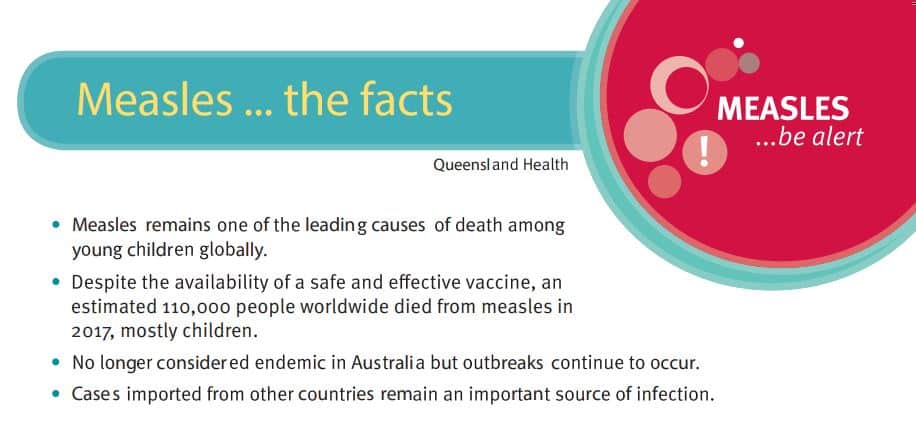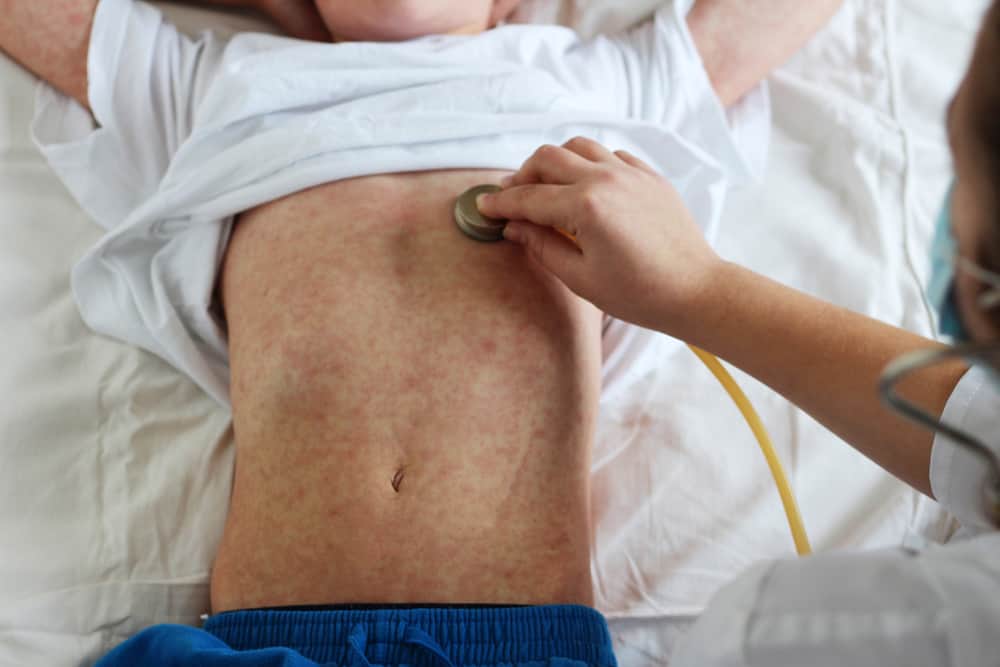There have been eight confirmed cases of measles in the Ipswich area in the past month according to West Moreton Health.
West Moreton Health public health physician Dr Vicki Slinko said staff have been working for the past few weeks to trace all those who may have been exposed to measles to try to prevent the disease and test all potential measles cases early to contain the infection.
Four of the patients have visited parts of Ipswich while unknowingly infectious, with the eighth confirmed case having visited:
- Falvey’s Grand Hotel, Yamanto from 10pm Friday 26 November to 2am Sat 27 November 2019
- Booval Shopping Centre including Woolworths around 11am on Monday 2 December 2019
- Sunshine Kebabs and Pizza, Acacia Ridge, in the afternoon of 2 December 2019
- HL Max Tyre and Wheels, Archerfield, in the afternoon of 2 December 2019
A previous case also attended these locations while unknowingly infectious:
- Riverlink Shopping Centre, including Ally Fashion, Kmart and the food court on Wednesday 4 December between 3.30pm and 4.30pm
- Riverlink Shopping Centre, including Woolworths and Kmart on Friday 6 December between 11.00am and 11.30am
More locations from previous alerts for Ipswich here and here.
“People in those areas at those times who are unsure or have concerns about their or their children’s immunity to measles should contact their doctor to check whether they have had a full course of two measles vaccines,” Dr Slinko said.
Five of the eight patients with confirmed measles have been treated at Ipswich Hospital Emergency Department (ED). WMH’s infectious diseases team have been tracing and following up to check the immunity and health status with any other patients in ED when these cases presented.
Dr Slinko said measles spreads very easily in the air when a person with the infection coughs or sneezes, so people in those areas should particularly look for symptoms over the next couple of weeks.
As there have been several other people infectious with measles in a variety of public places over the last three weeks, all residents of Ipswich and surrounding areas need to be aware of the signs and symptoms of disease.
“People who are unsure or don’t know about their immunity to measles should contact their doctor to check whether they have had a full course of two measles vaccines,” Dr Slinko said.
Dr Slinko is also urging other members of the public in Ipswich and surrounding communities to talk with their doctor about vaccination for measles – this is especially for those who are preparing for travel or who will have contact with travellers, especially over the holiday season. Measles would be a very unwelcome Christmas gift.
The initial symptoms of measles include fever, tiredness, runny nose, cough, and sore and red eyes.
“This is followed a few days later by a blotchy, red rash which often starts on the face and then becomes widespread over the body,” Dr Slinko said.
“If unwell with the symptoms of measles, it is very important to phone ahead to your GP or other health service and advise them first that you could have measles, so that staff can take precautions to prevent spread to others.”
Due to measles being common before 1966, anyone born before 1966 is considered immune to measles as they should have acquired immunity from natural infection.
Dr Slinko said people who have been adequately vaccinated with two recorded doses of Measles Mumps Rubella (MMR) vaccine are likely to be immune.
“Queensland Health staff will continue to actively investigate this case and do whatever they can to prevent further transmission.”
For more information on measles visit the Queensland Health website or contact 13 HEALTH
(13 43 25 84) any time, any day.

Measles begins with symptoms such as fever, tiredness, cough, runny nose and/or red inflamed eyes. These symptoms usually become more severe over three days.
The cough is often worse at night and the affected person may wish to avoid light because of sore eyes.
At this stage of the illness, there may be small white spots on a red base in the mouth on the inside of the cheek (Koplik’s spots).
This is then followed by a blotchy, dark red rash usually beginning at the hairline.
Over the next 24 to 48 hours, the rash spreads over the entire body, during which time the person generally feels very unwell.
Typically with measles, the fever is present and the person feels most unwell during the first couple of days after the rash appears.
The rash usually disappears after six days.
About the virus
Measles is an acute, highly infectious illness caused by the measles virus.
Measles can cause serious complications such as pneumonia (lung infection) and encephalitis (inflammation of the brain).
It may also cause middle ear infection.
Measles should not be regarded as a simple mild disease.
Deaths occur mainly in children under five years of age, primarily from pneumonia, and occasionally from encephalitis.
Complications are more common and more severe in people with a chronic illness and very young children.




